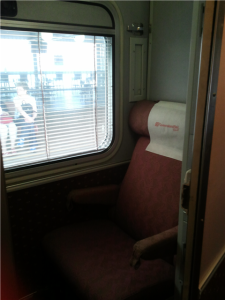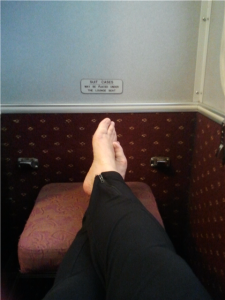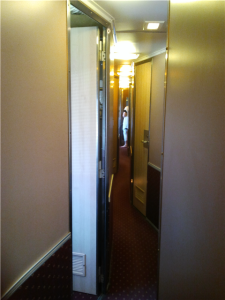I have always wanted to travel the world by cruise ship. Stopping at various places as I go, spending a bit of time in whatever county we end up in, then jumping on to another cruise and moving along to the next country.
In my dreams of course I’d be writing full time by then. With my laptop and the internet I could write from anywhere in the world.
Obviously, reality intrudes a little and for the moment I need my day job to pay the mortgage. But I recently took a cruise and one of my aims for the trip was to find out how practical it would be to actually write onboard.
First, some notes about the cruise. It was 17 nights, which by cruise standards is quite long and four of us shared a cabin. I have done cruises in a twin cabin before, so I’ll use that experience as well.
Finding room to write
The ship we were on was a relatively small ship and from my experience of other cruises, quite crowded.
At the start it was hard to bring out my laptop. There was lots to do and I felt embarrassed taking the computer out in public. Worse, everyone was so friendly, always prepared to talk, and all I wanted to do was sit hunched over a PC.
The best places to write were the tables in the casual food areas. The view was perfect, the tables were a good height and the chairs were ideal. Unfortunately, these tables were used for breakfast, lunch and dinner, and sometimes afternoon tea as well. Seats were at a premium.
It occasionally got quiet. Like between 4 and 5 pm in the afternoon, and after 9pm at night.
It would have been perfect to work in the ship’s library. They had nice seats at the tables, with some well positioned to watch the sea while you typed. Unfortunately, if you didn’t arrive right on opening time then your chances of getting a seat were about the same as your chances of winning the lottery, and you’d probably have a better chance of winning the lottery.
Had I been travelling on my own, or with just one other person I could have written in the cabin . There was a desk/dressing table in the cabin and it had a good chair. However, with four of us the desk was always covered as it was the only flat surface. Not to mention the constant traffic of people trying to get past, and the distraction of other people in the room.
Not only that, the cabin we booked had a lovely big window but if I was sitting at the desk I couldn’t see out the window, which was a waste, given that we were on a cruise.
So I tried for the bars. There were a few, and some were better than others. Not to mention that there was always some activity on, or about to go on, in most of them. Even so, I managed quite well by bar hopping my way around the ship and got to sit by lots of windows staring out at sea.
It’s a lovely ambience for novel writing.
Power
There was one power point in the cabin. Between the four of us we had two computers, two iPads and four mobile phones. That power point was in constant use. Sometimes my computer couldn’t be charged immediately.
Finding time to write
I got a lot of writing done on the days at sea, nothing on the days we were in port. After all, if you’re in a new place are you going to sit around writing your novel or are you going to explore? Me, I’m going to explore. That’s one of the joys of cruising, going to new places in comfort.
I did most of my writing during the day, going to dinner, bars (to drink this time) and shows in the evening. I couldn’t write in the cabin at night, because when you’re sharing with others you can’t.
Thus, if you want to write on your cruise, pick one with lots of days at sea.
Health issues
Most bars aren’t ergonomic. I spent my writing days on low seats with my netbook on my lap. I’d do this for hours at a time. Some days when I got up my back was agony. I learned soon enough to get up and move around and stretch occasionally. This is basic common sense for any writer, but it’s easy to forget when you’re on a cruise.
Cruises and food go together. The food is plentiful and for the first few days of any cruise you eat way too much, and often foods that you wouldn’t normally touch. For example, I hardly ever eat dessert at home, but I ate it every day on the cruise. All this food, plus alcohol, combined with sitting around typing for a lot of the day, can be disastrous to your waistline.
In summary
I would do it differently next time.
First, no more than two of us in the cabin. Four people in one cabin doesn’t give you any cabin writing time at all.
If I could afford it, I’d get a balcony. It was beautiful sitting, writing, watching the ocean. Imagine how much better it would be if you could do that on your own balcony, and on cold days looking through a floor-to-ceiling window to the same.
I would exercise more and eat less. These are things you don’t have to be on a cruise to think about. Writing is sedentary. You have to keep moving to keep fit. Don’t wait for a cruise to do this. Do it now.
I didn’t get as much writing done as I hoped, but by the end of the cruise I had a good schedule going. By the end I was up to 2,000 words a day, even if I didn’t take part in many ship activities. I proved I could do it. Not only that, the sea and the travel and some of the people I met helped add character to my story.
I will definitely do it again.



